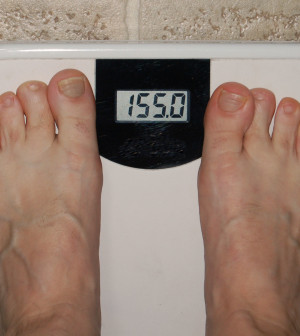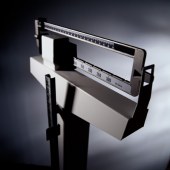- Could Your Grocery Store Meat Be Causing Recurring UTIs?
- Are You Making This Expensive Thermostat Error This Winter?
- Recognizing the Signs of Hypothyroidism
- 10 Strategies to Overcome Insomnia
- Could Artificial Sweeteners Be Aging the Brain Faster?
- Techniques for Soothing Your Nervous System
- Does the Water in Your House Smell Funny? Here’s Why
- Can a Daily Dose of Apple Cider Vinegar Actually Aid Weight Loss?
- 6 Health Beverages That Can Actually Spike Your Blood Sugar
- Treatment Options for Social Anxiety Disorder
Keeping That Weight Loss Resolution


If you’re one of the many Americans who plan to lose weight next year, there are a number of things you can do to improve your chances of success, an expert says.
“It should be clear by now that there is no one diet that works for everyone,” Jill Ashbey-Pejoves, lead dietitian at Northern Westchester Hospital in Mount Kisco, N.Y., said in a hospital news release.
“The best diet is the one that works for you. Don’t starve yourself or eliminate entire food groups,” she advised.
If you want to lose weight, you need to eat a healthy and well-balanced diet, she said. Deprivation diets don’t work because depriving yourself of something just makes you want to eat it even more.
Plan what you’ll eat each day, so you won’t be forced into a quick decision and make a poor choice. Pack your own lunch and snacks. Eliminate unhealthy snacks and desserts from your home and replace them with fruit, Ashbey-Pejoves said.
Track your eating habits. Doing so keeps you focused and honest and helps you plan and see what works and what doesn’t.
Any weight loss effort should include exercise. A mix of aerobics, resistance training and stretching is best. Resistance workouts build muscle and muscle burns more calories. Doing only aerobics may not help you lose weight because that type of exercise stimulates appetite, Ashbey-Pejoves said.
Be sure to keep hydrated by drinking plenty of caffeine-free beverages.
Every meal should begin with a salad or broth-based vegetable soup. They help you feel full because of their high water content, but are low in calories. Many salad dressing are high in calories, so try seasoned rice vinegar instead, Ashbey-Pejoves said.
She also suggested that you use smaller plates; fill half your plate with non-starchy vegetables, put out a fruit bowl, and eat slowly and chew your food thoroughly.
More information
The U.S. National Institute of Diabetes and Digestive and Kidney Diseases explains how to choose a safe and successful weight-loss program.
Source: HealthDay
Copyright © 2026 HealthDay. All rights reserved.










